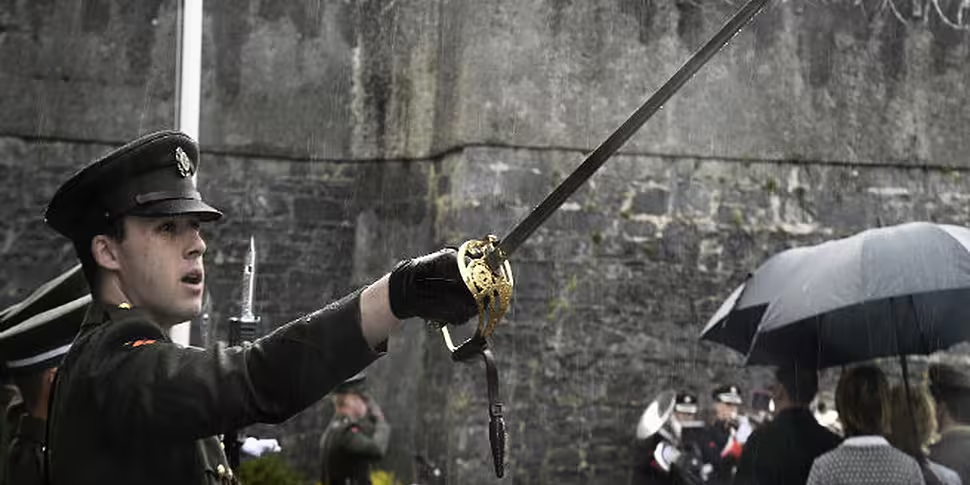Thomas Kent has been remembered at a special ceremony in Cork, as part of the 2016 Centenary programme.
An official commemoration of his execution was held in the yard of the Old Prison of Cork City.
It was attended by the Minister of State at the Department of Defence, Paul Kehoe, and Mr Kent’s relatives.
Minister Paul Kehoe (centre) with members of the Kent family and the Defence Forces | Image: Defence Forces
The ceremony involved a number of elements - including the reading of the trial documents relating the charge against Mr Kent, the plea that was entered, the verdict of the court and the sentence handed down.
A member of the Defence Force’s Chaplaincy Service and a member of the Irish Prison Service’s Chaplaincy Service attended and recited prayers.
Minister Paul Kehoe (left) with members of the Kent family and the Defence Forces | Image: Defence Forces
There was also a wreath laying service with a military colour party, military police wreath bearer and a piper’s lament.
A wreath is laid in the yard of the Old Prison | Image: Defence Forces
Speaking about the commemoration, Minster Kehoe said: “Thomas Kent believed in the ideals described in the Proclamation of Independence which declared the right of the people of Ireland to the ownership of Ireland”.
“Now 100 years on we are challenged to live up to the ideals and aspirations of Kent and the others who fought for an Ireland that ‘declares its resolve to pursue the happiness and prosperity of the whole nation’”.
A plaque commemorating Thomas Kent in the yard of the Old Prison, Cork City | Image: Defence Forces
A State funeral was held for Mr Kent last September in Co Cork.
His remains were exhumed from Cork Prison last June, and formally identified after DNA testing.
No part in the 1916 Rising
Kent was born to an Irish-speaking family on a farm near Castlelyons, Co Cork - the second of nine children.
A keen poet and playwright, he left home in 1884 for the United States to pursue a career in publishing, but spent the majority of his time working as a furniture maker.
He returned to Ireland in 1889, where his extended family became embroiled in a bitter dispute over land ownership.
After nationalist outbursts from Kent and his brother at one particular court hearing, he was sentenced to two months hard labour.
But public opinion was divided against the Kent family following the dispute.
Although they took care to maintain a low profile for the next decade, the Kents' vocal expressions of republican sentiment had been noted by police, and from then on, they were surveilled as potential traitors to the Crown.
Thomas Kent | Image: RollingNews.ie/National Library of Ireland
Kent did go on to fervently support both Sinn Féin and the Gaelic League. He also helped found the Castlelyons branch of the Irish Volunteers, and was present at the 1915 funeral of O’Donovan Rossa.
After inciting disorder at a recruitment rally for the British Army just four months before the Rising, Kent was once again taken to jail as a dissident. A little over a month later, he was acquitted of charges of sedition and allowed to go home.
When Easter Sunday arrived, the Kent brothers were ready. However, the initial countermanding order from Eoin MacNeill arrived and the family obeyed - staying at home and taking no part in the Rising.
The rebellion went ahead in Dublin, but the Kents were none the wiser until the family home was raided by the RIC as part of a nationwide bid to round up supporters of of nationalist groups.
Not to be taken without a fight, a four-hour gun battle ensued, where an RIC officer was killed and two members of the Kent family wounded - one mortally.
Thomas Kent was court martialled, convicted of treason, and sentenced to death.
It is said the 51-year-old was shaking so badly with nerves that a chair had to be provided for him to sit-in so he could be shot.
He was killed by a firing squad of 12 men, on May 9th 1916.














